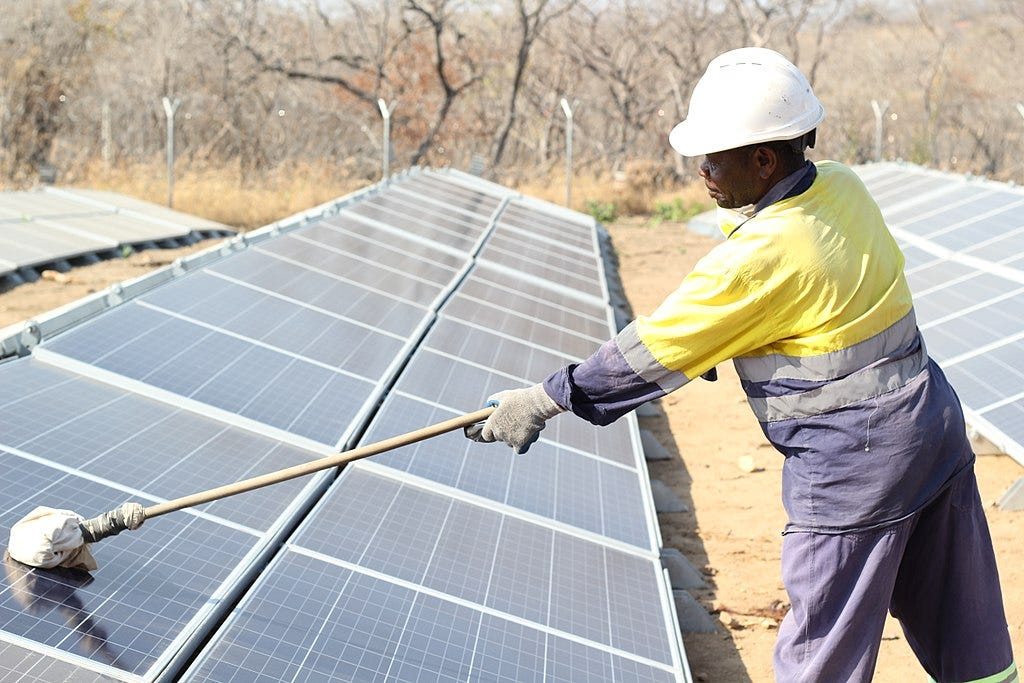
This is a fresh post from Worldwise, a newsletter for global insight and journalism where current affairs meet humanity.
It’s written by Anita Makri. If you like what you’re reading, let me know by tapping the little heart button or spread the word by sharing the post.
Was this forwarded to you? Learn more and sign up here.

Photo by Deo photographer on Wikimedia
The Worldwise View
It’s no secret that what makes news is usually about where things go wrong.
That’s certainly been the case for climate change—plenty of negative trends to report on.
Take the latest: global methane levels have soared to a record high. The Siberian heat streak and record temperatures seen recently in the Arctic were virtually impossible without global warming (WaPo + Economist + BBC). And there’s the news that Covid-19 is disrupting the work of the scientific working group responsible for climate mitigation.
There’s more, of course—you’ll find a selection at the end of this post.
But recently, I’ve also picked up on plenty of reports that focus on potential solutions. And this isn’t an accident: there’s a whole branch of journalism dedicated to this.
Championed by the Solutions Journalism Network, solutions journalism is an energetic movement to expand critical reporting of what’s going right in the world—for instance, how people and organisations are responding to problems like climate change.
It’s not without its critics. A report in Columbia Journalism Review by Matthew Ingram articulates concerns it can amount to escapism or avoiding uncomfortable questions. Samantha Grasso writes in Vox that by focusing on feel-good stories, we can end up missing societal failures. And this feature for Nieman Reports by John Dyer takes a closer look at the fine lines reporters and proponents need to tread to ensure rigour and avoid the pitfalls of a sole focus on solutions.
But like anything, solutions journalism has its place when it’s done well and as a part of a varied diet for our media consumption.
So here goes: a healthy dollop of recent reports focusing on potential solutions to the climate crisis—both the promise, and what’s not quite measuring up.
Decarbonisation
Spreading rock dust on fields could remove vast amounts of carbon dioxide from the atmosphere, according to the first detailed global analysis of the technique - Guardian + WaPo + Bloomberg
How to decarbonise international conferences? Go for biennials, regional hubs and virtual attendance - Nature
Many clean energy technologies are nowhere near ready, according to an assessment of 400 separate technologies. The gap is wider in four areas: electrification for uses like heating and transportation; carbon capture, utilization, and storage; low-carbon hydrogen and hydrogen fuels; and bioenergy - Vox
Investment, evidence and legislation
A new climate fund by a philanthropic initiative targets $2.5 billion in clean energy investment for Southeast Asia - Reuters
Finnish fund invests in climate-friendly and social development projects in Africa - Bloomberg
A relief fund is helping to keep green energy-access firms going through the pandemic in Africa and Asia - Reuters
One power of climate data: being in a position to discriminate, and therefore deciding access to financing - Bloomberg
Scientists are producing stronger evidence on the economic and environmental value of keeping tropic forests standing - Reuters
Can legislation make failing to act on climate change illegal? - BBC Future Planet
Protecting forests
A new platform matches funders and tree planters with an algorithm that pairs funders' preferences with vetted projects that "get the right trees in the ground, the right way" - Reuters
A UN-backed, joint Myanmar-Finland project will venture into conflict zones to track and protect the Southeast Asian nation's forests for the first time - Reuters + FAO
Guatemala is an example of how local people make better forest protectors than national parks - Yale E360
How fighting poverty accidentally stopped deforestation in Indonesia - Bloomberg + Reuters
A vision for the Himalayas as a nature reserve - Nature
Simple solutions
Something as simple as shade will be crucial as heatwaves get more frequent - Reuters
Is the first climate-resistant apple on the way? - Bloomberg
If you still want to know what’s going wrong
A water crisis looms for 270 million people as South Asia’s glaciers shrink - National Geographic
Brazil’s private sector calls for a stop to illegal forest destruction in the Amazon, as deforestation accelerates - Americas Quarterly + WSJ
In the Brazilian Amazon, China is buyer, trader, lender, builder—to potentially devastating effect - South China Morning Post
Deaths from heatwaves in Africa have been under-reported for a long time: better data could save both lives and economies - Carbon Brief + Reuters
Brazil’s president Jair Bolsonaro says niobium metal, which has various industrial applications, could be the country’s ticket to economic independence—if it wasn’t for indigenous land rights standing in the way. But a report from the Amazon finds no market for increased production - Climate Home
The cost of extreme weather due to climate change is underestimated - CarbonBrief
Why don’t we take climate change seriously? Racism is part of the answer: if climate change directly affected white Westerners, action would have come quicker - Open Democracy
But we can still end with good news…
Africa isn't falling for climate science deniers - Climate Correspondent
The end of the Arab world’s oil age is nigh - Economist
Worldwise is written by Anita Makri.
Enjoying it? Spread the word and invite a friend to sign up.
Was this email forwarded to you? Learn more and subscribe here.









